|
ANCIENT GREECE HAD SPECIAL FORCES CALLED SPARTANS WHO STOPPED THE VAST PERSIAN
INVASION OF EUROPE....IN JUNE 1918, THE U.S. MARINES STOPPED THE PRUSSIAN INVASION
OF PARIS, AND THEREBY SAVED THE ENTIRE WORLD FROM BRITISH-PRUSSIAN TYRANNY!!
THE "DEVIL DOGS" WERE BANNED FROM FIGHTING THE NAZIS IN WWII. |
|
Adolf Hitler was very familiar with the reputation of the 'Devil Dogs" because he served in the trenches in WWI.
From the Halls of Montezuma
To the shores of Tripoli
We fight our country's battles
In the air, on land, and sea.
If the Army and the Navy
Ever look on Heaven's scenes,
They will find the streets are guarded
By United States Marines. (Marine Corps Hymn on utube).
By banning the Marines from the European battlefields, the war was needlessly prolonged, and millions of lives were lost!
After WWII, Secretary of "Defense," Louis Arthur Johnston (1891—1966) tried to abolish the Marine Corps by merging the Army, Navy, and Air Force into one department called the Department of War....He also tried to ban the observance of the Marine Corps Birthday on November 10.....Only the outbreak of the Korean War saved the Marines from extinction!
The ancient Greek Spartans were the precursors of the U.S. Marine Corps!!
History does repeat itself in a marvelous way. Tyrannical King Nebuchadnezzar of Babylon had a terrifying nightmare that none of his astrologers or fortune-tellers could interpret. Finally, Daniel the Prophet explained to the king the meaning of his nightmare.
Daniel told the king that the dream was a preview of 4 world empires that would tread down the earth until the end of time. The second empire represented the Persian Empire that would seek to dominate the entire earth:
And now I (JEHOVAH) will tell you the truth: Behold, three more kings will arise in Persia, and the fourth shall be far richer than all of them; by his strength, through his riches, he shall stir up all against the realm of Greece (Daniel 11:2).
The second JEHOVAH appeared personally to Daniel and gave him a preview of the last 400 years of Jewish . . . and Christian history!
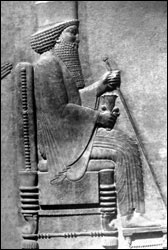
A statue of King Xerxes
(438 BC–385 BC).
|
| |
The Persian Empire replaced the Babylonian Empire when King Belshazzar saw the handwriting on the wall.
That empire was vast and fabulously wealthy. Its dominion stretched from Egypt to India (Esther 1:1).
King Xerxes also sought to add Europe to his vast domains.
Opposing him were the divided city-states of Greece which he expected to easily crush with his army of about 2 million men.
|
|
|
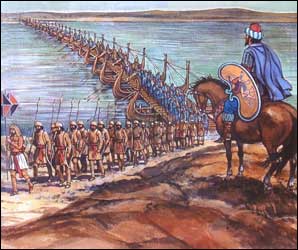
A pontoon bridge allowed the vast
Persian army to transit the Hellespont. |
The many city-states of Greece were dominated by Athens and Sparta. Athens was a maritime power while Sparta was a military state dominated by a warrior caste.
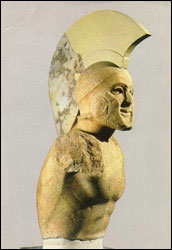
Marble statue of King Leonidas
(d. 480 BC). |
| |
The vast Persian army successfully crossed the Hellespont into Europe but then they were confronted by a narrow gap with the sea on one side.
King Leonidas took advantage of the terrain to force the Persians to fight on a narrow front.
That terrain neutralized the vast Persian superiority in manpower.
|
|
|
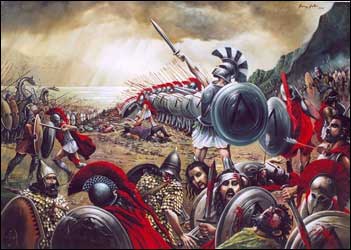 Outnumbered Spartans versus the Persian host
at the Battle of Thermopylae in 480 BC. |
King Leonidas was killed in the battle, and he was succeeded by General Pausanias, who confronted the Persians on an open plain the following year.
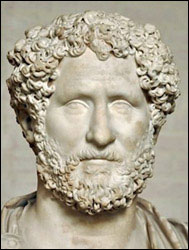
Bust of General Pausanias
(d. 397 BC). |
| |
The Greek city-state of Sparta imposed a severe and highly disciplined way of life on its citizens.
A boy began his military training at 7 and "boot camp" for a Spartan soldier lasted his entire life.
The word spartan has entered the language as synonymous with great courage, endurance, and harsh discipline. |
|
|
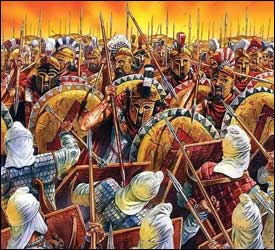
The Persians were defeated by the
Spartans at the Battle of Plataea.
|
The defeat of Persia by the Spartan prepared the way for the third universal empire of Alexander the Great.
Daniel was cast into the den of lions figuratively because the chronology in the Book of Daniel was extended by about 80 years (Daniel 9:27). Another strategy of that roaring lion Satan is to late date the Book of Daniel, as most "scholars" claim that it was written about 200 BC.
The U.S. Marines stopped the Boche at the Battle of Belleau Wood
The best know historical battle that occurred in the woods was the Battle of Ephraim's Wood between King David and his rebellious son Absalom. That battle ended in victory for King David and the death of his son Absalom (II Samuel 18:14-15).
After the Treaty of Brest-Livovsky was signed in December 1917, over 1 million Boche began moving to the Western Front.
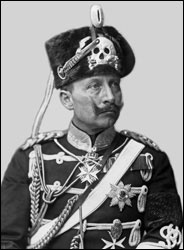
"Dead Head" Kaiser Wilhelm II was
at Queen Victoria's deathbed.
|
| |
Queen Victoria's favorite grandson assigned General Ludendoff the "honor" of leading the Prussians into Paris.
The operation was coded name Michael after the "patron saint" of Germany.
Success was guaranteed because the brave French were exhausted after 4 years of fighting and losing millions of men.
Field Marshall Douglas Haig had his ships on standby for a quick evacuation!
|
|
|

General Erich Ludendorff
(1865–1937).
|
No Doughboys were transported to France on British warships because those ships were required for rapid evacuation once the Prussians entered Paris.
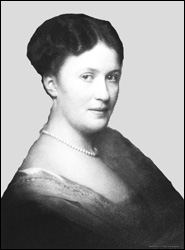
Queen Bertha Krupp
(1886 –1957). |
| |
By spring 1918 the Prussians were just 30 miles (48 km) from Paris.
"Big Bertha" was named after Krupp Queen Bertha.
The huge gun began lobbing shells into the city; soon to be followed by Prussian troops.
Many Parisian panicked and began fleeing the city. Not since August 1914 was the city in such grave danger! |
|
|
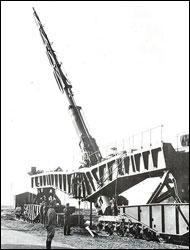
"Big Bertha" lobbed
shells into Paris.
|
General Pershing knew that the situation was critical, but the American Expeditionary Force (AEF) had just arrived in France a year earlier and most of the troops had absolutely no military experience. The one exception was the Marine Corps, who had experienced commissioned and non-commissioned officers.
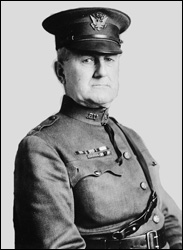
General James Harbord
(1866 –1947). |
| |
The Marine Corps was founded in Philadelphia in 1798 but their role in the military establishment was not clearly defined.
Neither soldiers nor sailors they were the nation's special forces.
The highest ranking officer in the Marines was a colonel, so General Pershing assigned Army General James Harbord to overall command.
Colonel Albertus Catlin miraculously survived a sniper's bullet through the chest and a fellow Marine carried him to a first aid station. |
|
|
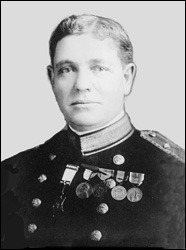
Colonel Albertus Catlin
(1868 –1933). |
Here is a quote from a history of the American Thermopylae by Colonel Catlin:
Early in May, shortly before we left the trenches. General Doyen, on account of ill health, was relieved of his command of the brigade by Brigadier General Harbord of the Army. Of course we were a bit disappointed not to have a Marine officer at our head, but there was no Brigadier General of Marines in France at that time, and it was advisable to have an officer of that rank in command of the brigade. But every Marine in the brigade knew that a better man could not have been assigned to the post. General Harbord had been General Pershing’s Chief of Staff; the very best had been sent to us, and that we appreciated. (Catlin, With the Help of God and Few Marines, p. 43).
Marine Corps recruits were chosen for their BRAWN . . . and the BRAINS . . . as many of them were college men. They were the brightest, bravest, and toughest hombres in the entire world.

"Dead Head" Crown Prince Wilhelm
(1882–1951).
|
| |
When the Crown Prince heard that the Marines were blocking his advance on Paris he ordered his most fanatical, husky Huns into the battle.
It was Armageddon in the Wood, and the Marines called it "Hell in the Wood."
Christian civilization hung in the balance as at Malta, New Orleans, Gettysburg, and Stalingrad.
General Richard von Conta commanded the fanatical Army Group German Crown Prince regiment. |
|
|
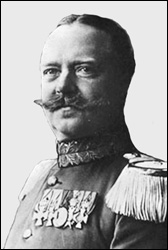
General Richard von Conta
(1856 –1941). |
The crack regiment named after the Crown Prince was ordered not to yield one foot of the wood to the Marines. The Boche used machine guns, poison gas and flame throwers while the Marines countered with rifles, bayonets, and knives.
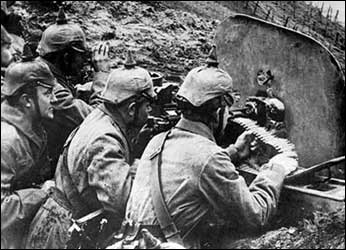
A Boche Vickers-Maxim-Krupp machine
gun squad waiting for the Marines.
|
| |
Belleau Wood was literally crawling with Vickers-Maxim-Krupp machine gun crews. Almost every tree concealed a machine gunner or sniper.
Only the bravest of men could withstand such a hailstorm of lead.
Every machine gun nest was covered by crossfire so the casualties were horrendous. |
|
|
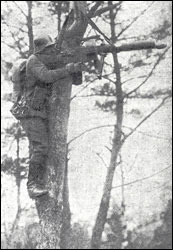
A Boche up a tree with a machine
gun waiting for the Marines. |
All Marines had to be expert marksmen and they also trained extensively with the bayonet. The Boche did not relish up close combat as they preferred to kill from a distance with artillery, machine guns, and rifles.
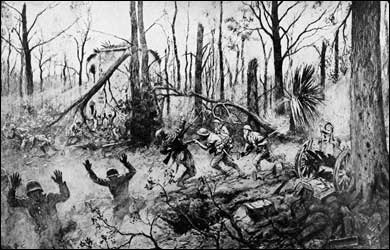
With rifles and bayonets the "Devil Dogs" chased
the Boche out of Belleau Wood.
|
| |
During the Battle of Belleau Wood the Marines earned the sobriquet "Devil Dogs."
Their mode of fighting up close with rifles and bayonets alarmed the Boche.
They were accused of "unsoldierly conduct," even though the Prussians used poison gas and flame throwers! |
|
|
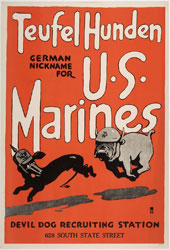
"Devil Dogs" recruiting poster. |
The Battle of Belleau Wood was a landmark event in Marine Corps history. Prior to the battle, the United States Marine Corps was a little known, unproven commodity. After three weeks of displaying the courage, determination, and win-at-all-costs attitude that has become synonymous with the Marine Corps in the years since, that all changed. .
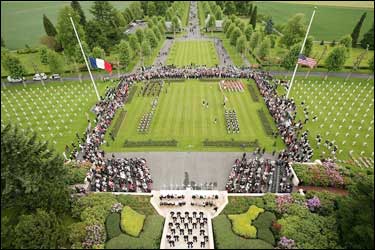
U.S. Marines and French soldiers at the 92nd
anniversary of the Battle of Belleau Wood. |
| |
After the battle, the French renamed Belleau Wood "Bois de la Brigade de la Marine," in honor of the critical battle that was fought and won there.
Without a doubt that battle was as critical to the survival of Christian civilization as the Battle of Thermopylae was to the survival of democracy in Greece. |
|
|
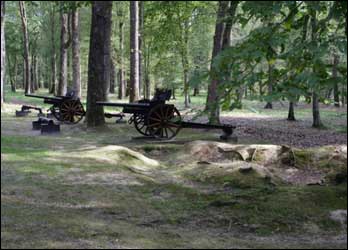
The American Thermopylae battlefield
is now quiet and peaceful. |
With their reputation as pugnacious warriors firmly established, the Marines participated in many more battles, until the Boche had enough of the "Devil Dogs," and "Kaiser Bill" called for a truce on November 11, 1918.
Hitler was guaranteed that the "Devil Dogs" would not fight the Wehrmacht
WWI was supposed to be the "war to end all wars," but it was just a truce and a prelude to a much more deadly conflict. The Crown Prince abdicated with his father in November 1918, but he returned to Germany in August 1923.
From that time onward he was the de facto ruler of the Weimar "Republic."
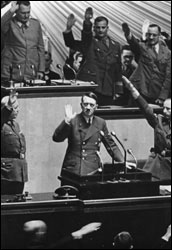
On Dec. 11, 1941, Hitler
declared war on the U.S. |
| |
Queen Victoria's other grandson spent WWI in the trenches as a courier (spy) and he knew all about the reputation of the "Devil Dogs."
Before he declared war on the U.S., "Uncle" Wilhelm assured him that the "Devil Dogs" would be banned from all the European battlefields!
He was not about to face the "Devil Dogs" again! |
|
|
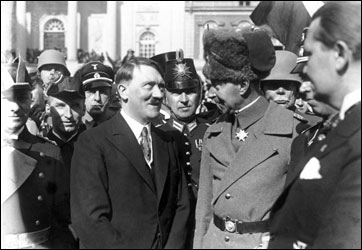
The Crown Prince and "Uncle" Adolf in 1933. |
President Roosevelt said that his top priority was the defeat of Nazi Germany, and the Marine Corps motto is "First to Fight." As Commander-in-Chief of the U.S. Armed Forces he never gave the command for the "Devil Dogs" to chase the Nazis back to Berlin.

General Thomas Holcomb USMC.
(1879–1965).
Commandant from '36 to '43. |
| |
General Holcomb was Marine Corps Commandant when war broke out in 1941.
He was a descendant of Confederate navy Lieutenant Joseph Barney.
It never occurred to him to send the "Devil Dogs" to fight Hitler.
Holcomb was replaced by General Alexander Vandergrift in 1944.
|
|
|
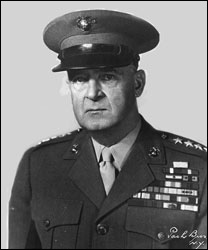
General Alexander Vandergrift USMC.
(1887 –1973).
Commandant from '44 to '47. |
Vandergrift never volunteered the "Devil Dogs" to help with the D-Day landings in France. It just goes to prove that you can put a man in a uniform but that doesn't make him a patriot.

Iconic photo of the Marines raising
the flag at Iwo Jima, Feb. 23, 1945.
|
| |
The Pacific War was just a sideshow while most of the attention was focused on "defeating" Hitler.
General MacArthur fought in WWI and he was a big and powerful man like the typical "Devil Dog."
After defeating the most highly trained and fanatical soldiers in the world at Belleau Wood, there was no glory in defeating little Japanese men. |
|
|
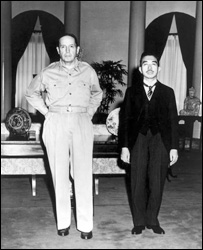
Towering General MacArthur and
the diminutive Emperor Hirohito.
|
The only role assigned to the Marines in Europe was guarding the U.S. Embassy in London.
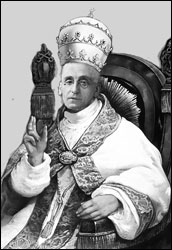
Pope Benedict XV
(1854–1922).
Pope from 1914 to 1922. |
| |
Pope Benedict XV was bitterly disappointed at the outcome of WWI.
It meant that there would be no restoration of the Papal States, and no revival of the Holy "Roman" Empire with its capital at Berlin.
Millions of German and French Catholics had been sent to "Purgatory" with no gain for the Church Militant.
Additionally, Russia was now officially atheist and the "prophecies" of Fatima could not be fulfilled!
|
|
|
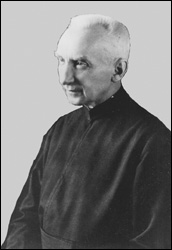
Wlodimir Ledochowski, S.J.
(1866–1942).
Jesuit general from 1915 to 1942. |
Jesuit General Ledochowski was also bitterly disappointed at the outcome....He arranged to send Pope Benedict to "Purgatory" in 1922, which prepared the way for Pope Pius XI.
Daniel Chapter 11 concludes with an overview of the end of Christian history . . . and it is not a very pleasant ending:
And he (Antichrist) shall plant the tabernacles of his palace between the seas in the glorious holy mountain; yet he shall come to his end, and none shall help him (Daniel 11:45).
Saint John the Apostle elaborated on the visions of Daniel the Prophet and he described Armageddon in vivid terms:
And when the thousand years shall be finished, Satan shall be loosed out of his prison, and shall go forth, and seduce (Gk. planeō: deceive) the nations, which are in the four corners (Gk. gonia: corners) of the earth, Gog and Magog, and shall gather them together to battle, the numbers of whom is as the sand of the sea (Apocalypse 20:7).
When Saint John saw that vision around 90 AD the earth was not a globe and had 4 CORNERS!
Vital
links Ge
Batty, Peter. The House of Krupp: The Steel Dynasty that Armed the Nazis. Cooper Square Press, New York, 2001.
Manchester, William. The Arms of Krupp. Little, Brown & Company, New York, 1964.
Simmons, General Edwin Howard. The United States Marines: A History, Naval Institute Press, Annapolis, Maryland, 1974.



 Outnumbered Spartans versus the Persian host
Outnumbered Spartans versus the Persian host 






















